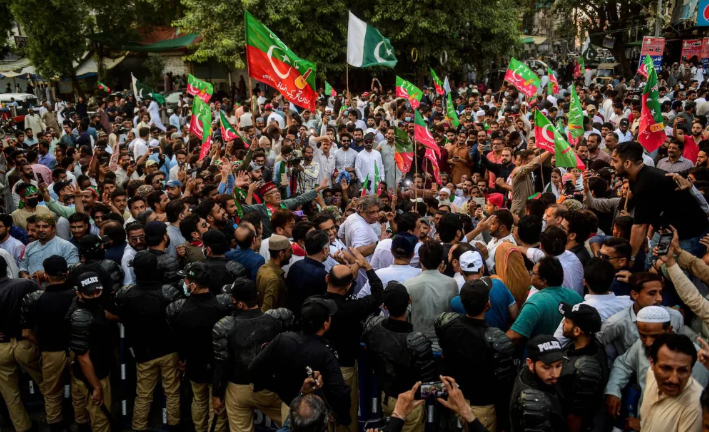
Pakistan is facing severe political instability following the ousting and arrest of former Prime Minister Imran Khan, resulted in agitator protests, violent clashes, and economic disruptions. This unrest gets exacerbated by incessant militant attacks and sectarian strifes, thus heightening internal security risks and complicating efforts to stabilize the country.
In the recent months, Pakistan has been subjected to an unprecedented wave of political unrest, which has not only shaken the country’s political landscape but also exacerbated internal security risks. The nation, already grappling with stability and economic challenges, now faces a precarious situation, where political instability intertwines with security concerns, thus threatening the very fabric of socio-political mosaic.
Recent events have markedly accentuated the crisis. In this regard, one of the most significant flashpoints was the ousting of former Prime Minister Imran Khan from the office. Though the vote of no confidence Khan’s removal with allegations of corruption and economic mismanagement, led to widespread protests and civil unrest. His supporters, particularly from his party namely Pakistan Tehreek-e-Insaf (PTI), staged large-scale demonstrations across the country. Those protests often turned violent, with clashes between demonstrators and the security forces, resulting in numerous injuries and fatalities. The chaotic scenes on the streets, including the storming of Government buildings and the burning of Police vehicles, underscored the fragile nature of Pakistan’s internal security.
Adding to the turmoil was conviction and arrest of Imran Khan on charges of corruption. His arrest led to immediate and severe reactions from his supporters, who termed the move as politically motivated and affront to democratic norms. The ensuing violence included attacks on Police stations, besides damage to public property, Attack on Army’s General Headquarters (GHQ) Rawalpindi and sporadic riots in major cities such as Lahore and Karachi. Those incidents not only heightened the sense of insecurity but also highlighted the growing polarization within Pakistani society. The vandalism displayed by PTI’s supporters on May 9th, 2022 is a bad chapter in recent political history.
The situation was exacerbated by the Government’s response to such protests. The crackdown on demonstrators, marked by allegations of excessive force and human rights abuses, fueled more resentment and instability. Reports of arbitrary arrests, the use of tear gas, and even live ammunition against unarmed protesters reportedly contributed to an atmosphere of fear and distrust. The heavy-handed tactics employed by Government deepened the rift between the Government and the opposition, making it increasingly difficult to find common ground. It is also an established fact that opposition has also not shown worthwhile seriousness for negotiations with current political dispensation. It rather initiated on striking a deal with establishment.
The economic impact of this unrest has been severe. The protests and violence have disrupted businesses, leading to economic losses and a decline in investor confidence. Key sectors such as tourism and trade, have been adversely affected, exacerbating Pakistan’s existing economic difficulties, including high inflation and unemployment. The economic strain has led to increased public frustration and a sense of helplessness, further fueling the cycle of unrest and instability.
Another critical incident that has amplified the security risks is the resurgence of terror activities. In the recent months, Pakistan has witnessed a disturbing uptick in terror attacks by insurgent groups, including the Fitna Al Khwarij (infamously known as TTP) and other extremist factions. These groups have exploited the political chaos to advance their agendas, leading to a series of bombings and assaults targeting security forces and public infrastructure. The increased activity of militant groups poses a significant threat to national security while underscoring the dangers of a deteriorating internal situation.
The ongoing conflict between different ethnic and sectarian groups has also intensified the sense of insecurity across Pakistan. In regions like Balochistan and Khyber Pakhtunkhwa, the unrest has aggravated existing tensions and fueled violent confrontations. The fragmentation of society along ethnic and sectarian lines is a dangerous trend that undermines national unity and stability.
The international dimension of Pakistan’s internal security risks remains noteworthy. The country’s geopolitical significance, coupled with its strategic location, makes it vulnerable to external influences and interventions. Recent diplomatic tensions with the neighboring countries and the potential for external actors to exploit the situation further complicates the security landscape.
Addressing these internal security risks requires a multifaceted approach. Firstly, there must be a concerted effort to de-escalate the current unrest. This involves engaging in inclusive political dialogue with various political factions, addressing the legitimate grievances of the populace, and ensuring a fair and transparent legal process. The Government must also adopt a more balanced approach to handling protests, avoiding excessive force and protecting the rights of all citizens.
Second should be the strengthening institutions which is equally crucial. Ensuring the independence and effectiveness of the judiciary, enhancing the capabilities of law enforcement agencies, and implementing economic reforms to stabilize the economy are essential steps in mitigating the risks associated with political unrest. Once the institutions will be strengthening and more powered, it will lead towards the political stability. Political stability ensures economic stability. Last but not least, it is crucial to recognize the concept of “Pakistan first’. Promoting national unity through inclusive policies and addressing ethnic and sectarian tensions can help restore social cohesion and help to restore the notion of “Pakistan First”.
Pakistan stands at a critical juncture where political unrest is significantly amplifying internal security risks. The interplay between political instability, violence, economic hardship, and social fragmentation presents a formidable challenge to the country’s stability. Recent events, including violent protests, Government crackdowns, economic disruptions, and militant activities, have further exacerbated these risks. Addressing the crisis requires resilience and a comprehensive strategy from all stakeholders to navigate the nation toward a more stable and secure future.



















Leave a Reply